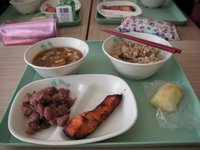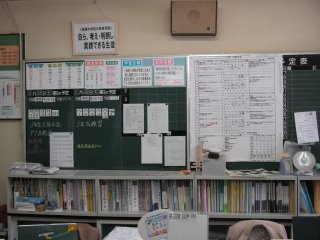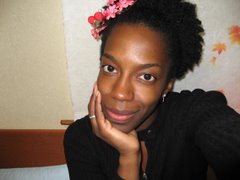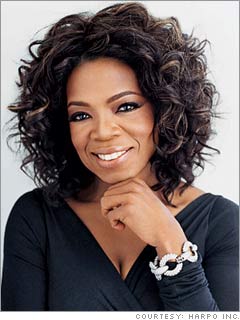
My body is confused...
It's early Saturday morning and my body is supposed to be recovering from the fun I had last night, sealed in a cocoon of futons and body heat. But instead, it's animated, fueled by Special K and obligation. I am at school today and I'm suffereing from major cognitive dissonance: I'm here, yet I'm not supposed to be. Everyone else is here as well, though the vibe is they much rather not be (or maybe this is just normal for them since they are Japanese teachers).
The reason for this weekend blasphemy is my 3rd grade JHS students will be graduating in a couple of weeks and there is a special PTA meeting and some kind of goodbye ceremonyl going on later in the day. But make no mistake - this is a real school day filled with classes (I have 3) and tests. But the good thing is I have daikyu on Monday, meaning the school will be closed + there will be an enkai tonight, and I plan on drinking copius amounts of sake to deaden the sting of the 5,000 yen charge.
I don't have any news to report so I'm just going to wax on about life at a Japanese JHS. This is my first experience in a junior high school, as there is no such thing in Montreal. There are 3 grades in a Japanese JHS: grades 1, 2 and 3, which is the equivalent to 7, 8 and 9. The kids run in age from 12 - 15, which is probably the toughest years of adolescence. Remember dealing with puberty, acne, unrequited love and algebra? No? That's nice. I'm reliving it here, but this time in a foreign language. Luckily, I only have to deal with 12 to 14 kids at any given time, not the average 40 most of my counterparts have.
The kids at Neo JHS are great - truly exceptional young 'uns who are polite, well behaved, friendly and bright. Maybe it has to do with the clean moutain air, or inaka living, but I've never once had a problem with these kids. That and they are maddingly good looking. I've never seen so many dimples in one place.
On an average day, you can find the kids here sometime before eight. I don't know the exact time because I only get here around 8:20, but I see them biking to school from my apartment. Their day is composed of 6 periods where they learn Japanese, English, music, social and moral studies, phys ed., math, science, homemaking, geography and other subjects I'm probably forgetting. They also have an elective class where they can choose conversational English, art, cooking and other things. They also have 35 minutes for lunch, 20 minutes free time, and 15 minutes for cleaning (I'll break these down in a bit). On top of that, they have to practice their musical instrument, the okarina, everyday because they participate in concerts in the Gifu area. They also have about 30 minutes at the end of the day for club activities where they can practice badminton, ping pong or kendo.
 The middle part of the day is designated for eating, playing and cleaning, and with the exception of playing, the other components are completely different to school life in Canada. I've mentioned before that there is no cafeteria here. Instead, the school lunch is prepared at the kyushokku centre which is conveniently right next door to the school.
The middle part of the day is designated for eating, playing and cleaning, and with the exception of playing, the other components are completely different to school life in Canada. I've mentioned before that there is no cafeteria here. Instead, the school lunch is prepared at the kyushokku centre which is conveniently right next door to the school.  Everyday around 11:30, containers containing the rice, protein, vegetable and soup components of the meal, as well as the milk and occasional dessert, arrive at the back of the school. While the cleaning lady takes care of the lunch for the for the kocho and kyoto senseis, and the teachers that don't have homerooms, the kids are responsible for picking up the containers, dishing out the servings, cleaning up after themselves, and delivering the containers. Each classroom has a designated team that rotates on a mysterious basis. Everything is in order right down to the number of plates, bowls and chopsticks. During lunch, the atmosphere is really laid back and it's a time when the kids can tease each other and the students and the teachers (including me) without fear of a reprisal.
Everyday around 11:30, containers containing the rice, protein, vegetable and soup components of the meal, as well as the milk and occasional dessert, arrive at the back of the school. While the cleaning lady takes care of the lunch for the for the kocho and kyoto senseis, and the teachers that don't have homerooms, the kids are responsible for picking up the containers, dishing out the servings, cleaning up after themselves, and delivering the containers. Each classroom has a designated team that rotates on a mysterious basis. Everything is in order right down to the number of plates, bowls and chopsticks. During lunch, the atmosphere is really laid back and it's a time when the kids can tease each other and the students and the teachers (including me) without fear of a reprisal.  Things get pretty wild when there is a piece of fruit/fish/meat leftover because all the kids that want whatever there is must settle things by janken (rock, paper, scissors). For those who don't know, everything in Japan comes down to janken. I'm sure major deals and policies have been made by janken. Sometimes, when there is something that I want (always fruit), I get in on the janken, but I've always lost (so far).
Things get pretty wild when there is a piece of fruit/fish/meat leftover because all the kids that want whatever there is must settle things by janken (rock, paper, scissors). For those who don't know, everything in Japan comes down to janken. I'm sure major deals and policies have been made by janken. Sometimes, when there is something that I want (always fruit), I get in on the janken, but I've always lost (so far).Shortly after lunch, the kids break up into groups of 3 or 4, with minimum 1 from each grade, and go to their designated rooms for soji, which is Japanese for cleaning. This is where it's really different from Canada because as opposed to having janitors who clean the whole school, the kids do it. I think it's really great because it teaches the kids to take responsibility for their surroundings because they know that if they mess something up, they'll just have to clean it later. Soji can probably also be thanked for the stark cleanliness of Japan. Dan in Japan just posted a really good commentary about this that you can find here: http://ds777.blogspot.com/2006/02/wednesday-night-fever.html
It didn't take very long for me to get completely used to the routine of the school day and I love interacting with the kids. During today's sayonara ceremony for the 3rd graders, I actually started tearing up because I realized that in a few weeks, these kids, all 14 of them, will be gone and the school won't be the same without them. Soon, I'll have to say goodbye to Mamie, Mai, Rie, Honami, Aki, Akari, Yuki, Tsubasa, Takahiro, Keisuke, Kyohei, Kota, Kazuyuki, and Koji. I'm going to miss them asking me what "pimping" means and having them be my translators during lunch hour. I've only known them for 6 months (since September), but I'm going to miss them. I'm not looking forward to saying goodbye to this year's 2nd grade when they leave next year because I've gotten even more close with them.

A bientot.





No comments:
Post a Comment